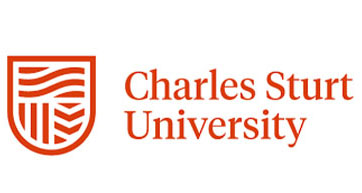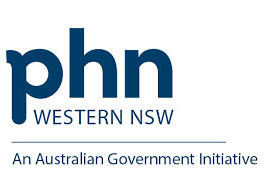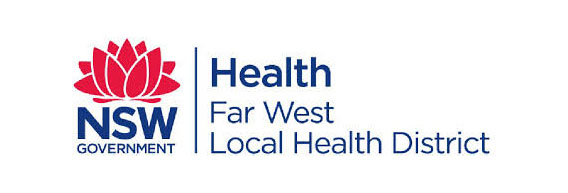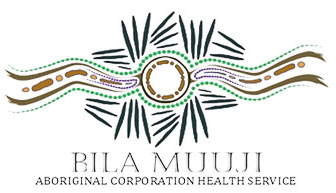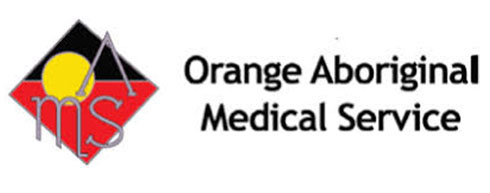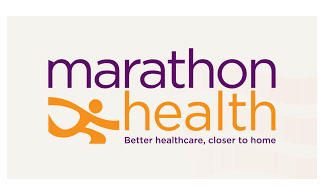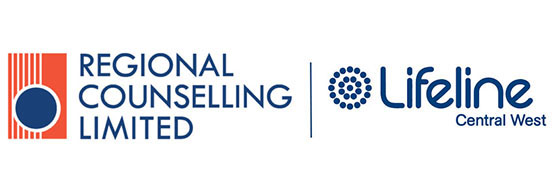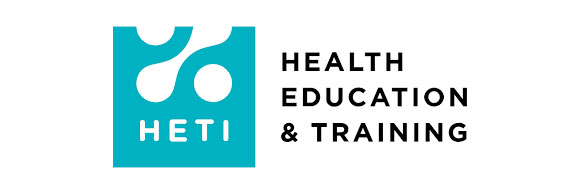The 2025 Research Symposium Scientific Program will be held on Tuesday 4th November at Charles Sturt University, Orange Campus.
The WHRN2025 Symposium will our twelfth annual research symposium with presentations celebrating research in line with this symposium theme “Building Research Networks: Collaborative Approaches to Rural Health Research”.
The 2025 program will include a mix of research presentations (general, emerging, open and student) rural health categories to encourage broader community involvement in the Symposium.
The open category is designed for rural health services, organisations, community workers, Elders, other community members and advocates to showcase their work, ideas, projects, reflections, and stories about rural health. Individuals are invited to share lived experiences and changes needed in health services. WHRN recognises the value of these contributions that don’t fit neatly into the traditional scientific abstract format.
The student category is for students undertaking rural health related research as part of their course curriculum. We hope you can join us for an incredible celebration of health research in Western and Far Western NSW.
2025 Key Research Themes
- Networking Strategies
- Interdisciplinary Collaboration
- Community Engagement
- Funding and Resource Sharing
- Best Practices in Partnership Development
- Sustainable Models for Research Networks
While submissions relating to these sub-themes are encouraged, abstracts detailing rural health research, and service provision and experiences outside these sub-themes will still be considered.
How do I submit an abstract?
Step 1: Decide which category you are entering
This year we have two categories of ‘scientific’ abstracts and a third, new ‘open’ category.
The scientific abstract categories are for:
- General research: for completed rural health research projects and/or more experienced
presenters. - Emerging research(er): for rural health research projects in development or in progress and/or
less experienced presenters. First-time presenters, students and early career researchers are
encouraged to submit in this category. You do not necessarily have to present research results
but could provide an overview of a current research project and discuss any challenges or issues you are experiencing with your research project.
The student category is for:
- Student researcher: uses the same guideline for emerging presenters above but we have added the student category which can be selected when completing the submission through AwardForce.
The open abstract category is for:
- rural health services, organisations, community workers, Elders, other community members and
advocates to showcase their work, ideas, projects, reflections, and stories about rural health - or for submissions that don’t fit neatly into the traditional scientific abstract format e.g. arts and
health projects, community health projects.
Individuals are invited to share lived experiences and changes needed in health services.
The intent of this category is to encourage community voices to join the WHRN 2022 symposiu
Step 2a: Prepare your abstract
- You will need to prepare a structured abstract, with a maximum of 400 words (not including the title).
- Your abstract should be structured using the following headings:
- Background and aims
- Methods
- Results
- Implications or Conclusion
- You will need to prepare a structured abstract, with a maximum of 400 words (not including the title).
- Your abstract should be structured using the following headings:
- Background and aims
- Methods
- Results (if applicable) or expected outcomes
- Challenges (if applicable)
- Implications or Conclusion (or take-home message)
- Student abstracts should still follow the format above for emerging research, however when you submit your abstract you should select the “student” category in AwardForce.
- You will need to prepare a structured abstract, with a maximum of 400 words (not including the title).
- Your abstract should be
structured using the following headings:
- Background and aims
- Methods
- Results (if applicable) or expected outcomes
- Challenges (if applicable)
- Implications or Conclusion (or take-home message)
**Students are reminded that we suggest they provide a copy of their draft abstract to their research supervisor prior to submission and check the requirement to list co-authors**
Here are some ideas and hints for completing a research abstract:
| Title | Your title should clearly and concisely tell your audience what your research is about. Use relevant keywords and try to keep it to 25 words or less. |
|---|---|
| Background & aim(s) | This section should briefly describe the issue that your research addresses (or aims to address). It should explain why you are doing the research, outline what the study is trying to achieve, and may include your research questions. |
| Methods | This section tells the reader how you did/will do the study. It should describe the study design, your sample/participants, data collection methods, and data analysis. |
| Results (if applicable) or expected outcomes | This section briefly outlines the key findings of your study. What were the answers to your research questions? You don’t have to detail all your findings, just the most important ones. Or you might outline what sort of information your project will produce and what this might achieve. |
| Challenges (if applicable) | Here you might want to describe challenges you’ve encountered in the design or the conduct of your research. This is a great opportunity to flag areas that you’d like the WHRN audience to help you with! |
| Implications or Conclusion (or take-home message) | Here you should briefly explain what your findings mean for service delivery, for patients, for the community, for health policy or for research. What should change because of what you have discovered? You might outline the study’s potential impacts. Please do not include references, tables, or figures in your scientific abstract. |
Open Category abstracts:
- Open category submissions can take many forms.
- If written, please provide up to 400 words describing your service, idea or experience – tell us about how it relates to rural health and what might be the implications for health policy.
- We are happy to accept more creative, one-page (A4) submissions too e.g. creative writing, artwork, photography, multimedia, and recorded performances.
Step 2b: Abstract tips, considerations and assessment criteria
Need help writing a scientific abstract?
Please watch the WHRN on demand workshop: “how to write a scientific abstract”
Other considerations:
When you submit your abstract (via the online Award Force portal), you’ll be asked:
- if you are happy for your scientific abstract to be considered for a poster presentation (if you are offered a poster presentation, you will be sent guidelines)
- to name all authors or contributors, nominate the presenting author/contributor(s) and the main contact, and provide details of any co-authors/contributors, including their name and prefix (i.e. Mr, Ms, Mrs, Dr, A/Prof, Prof), organisation and location (town/city).
Abstract Assessment Criteria
The Scientific Committee use the following criteria to review abstracts for the scientific program (i.e. emerging and general abstracts):
| Aim/Question/Hypothesis | Is the aim/question/hypothesis clear? |
|---|---|
| Analytical Approach / Critical Thinking | Has there been a thoughtful approach to the study design? |
| Interpretation | If applicable, have the results been understood and interpreted correctly? Are take home messages clear? |
| Rural Health Relevance | Is the relevance to rural health forefront in the study design and, if applicable, analysis? |
| Study Design Quality | Is the research methodologically sound? |
| Originality and Research Interest | Alignment with community need and health priority areas. Is this creative and interesting research? |
| Abstract Quality (Writing) | Is the abstract easy to read and covers all key elements of a research abstract? |
| For Emerging and Student Researcher submissions | Are you an early career/novice researcher? If yes, are you based rurally? Or urban based with a rural interest? |
| For Open category abstracts | Will be reviewed for their relevance to rural health, relevance to the symposium theme and sub-themes and potential to broaden knowledge and our understanding of factors contributing to rural health. If it is a written abstract, the quality of the content will be reviewed in terms of providing information on background or context to the issue discussed, and relevance to rural health and community needs and health priorities. |
Step 3: Submit your abstract via the online Award Force portal
First time users of Award Force will need to Register
Once you are logged in to Award Force – select the category: WHRN 2025 Research Symposium – abstract submission
Then select your abstract category:
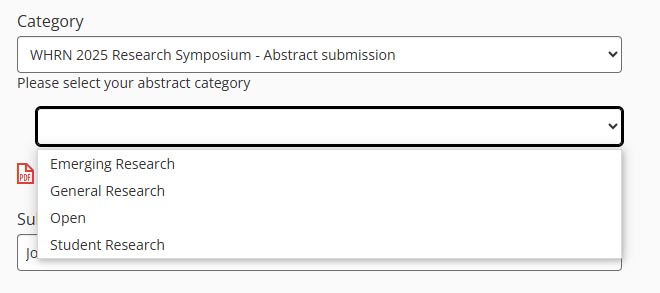
At the bottom of this page you can also download a blank abstract template for your reference:
Click the Save + next button to allow you to progress through the tabs to add authors/contributors and your abstract submission.
You can save your progress at any time.
Once happy, don’t forget to click the Submit entry button. Entries close @ 5pm Monday 4 August 2025.
If you have any questions, please email Melissa Nott, Chair of the WHRN Scientific Committee, at mnott@csu.edu.au

